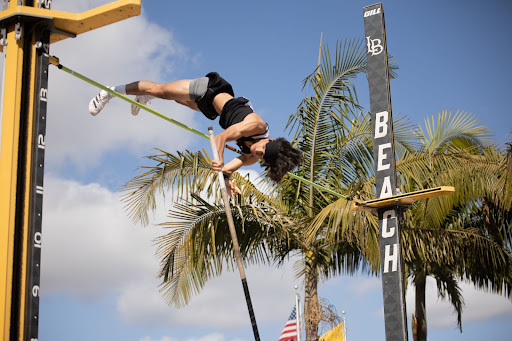Student athletes give insight into culture in CWU sports
“Culture is a huge part of any winning.”

Jacob Thompson performing his season-best pole-vault at the Beach Invitational.
April 27, 2022
Sports teams measure success in various ways. Most of the time a team’s success can be judged based on the record they have that season. However, that isn’t the only way teams judge a season as successful.
One of the things that athletes point to first when discussing their teams and how they find success is the culture that they build throughout the season.
“A big part of it for us is throughout the year we’ve grown to really try and play for each other, play for the next guy in line … really try and pick everyone else up,” said senior outfielder Michael Copeland.

The CWU men’s baseball team currently sits with a 12-29 record, or a .293 winning percentage. Their next series is against Saint Martin’s University in Lacey, who hold a 14-25 record.
“For our season there’s been a lot of struggles and so picking each other up and making sure everyone has each other’s backs has been one of the most important pieces for us,” Copeland said.
As a senior, Copeland nears the end of his collegiate play, but he thinks it’s important to instill a winning attitude and culture for next year’s team and for teams going forward.
“That culture is a huge part of any winning … It’s a blueprint or a road map to success if you’ve had that culture and had success practicing that culture,” Copeland said. “It gives next year’s team a guide on how to operate and what to do.”
Copeland has been a part of a winning team in the past, the CWU baseball team from the 2021 season, which had a 16-14 overall record and went 14-10 in conference play.
“A bad culture can really infect a team from inside; it only takes one guy to really get someone or a group off course,” Copeland said. “Having culture and everyone on the same page of what you’re trying to do, everyone pulling for each other is very important for success.”
What culture means to teams differs from sport to sport. The way that baseball players think about culture and work ethic won’t entirely translate to other programs.
“A defining part of track’s culture is the diversity we have; we have a lot of different people from a lot of different places,” said senior Jacob Thompson. “We have kids transferring in from other schools in Washington or from out of state. So it’s a lot of different … experiences we all have, that we can all share. And being on this team together is the one thing that connects us all together.”
Thompson recently had a season-best performance at the Beach Invitational in Long Beach, California, posting a pole vault of 4.52 meters (14’ 10”). As a senior, he takes on a leadership role among the team.
“Track’s always been a little unique … we have so many different event groups, and we never really practice at the same time in the same locations,” Thompson said. “Coming into the year when we all start fall training, it’s a little difficult to really build a big team culture, but you get to know your individual groups.”
As a pole-vaulter, Thompson cited spending most of his fall training with sprinters, horizontal jumpers and other pole-vaulters. But once the competing season starts, there’s more intertwining between groups.
“We don’t really get a chance to hang out with the throwers or a lot of the distance guys because they’ll be doing their cross-country season at the same exact time. So it’s a little harder to have a cohesive team culture,” Thompson said. “Once everyone’s all together, we’re all riding the bus together; we all make efforts and we do activities to learn more about people and other event groups or talk to people you don’t normally talk to.”
The track and field team will travel to the Oregon State High Performance meet on April 29, as they prepare for the championship meets at the end of May.
“Having that good base of a culture sets that baseline where we want everyone to be, where we know we will be successful and where we can support everyone on the team,” Thompson said. “Culture, it’s important to have.”


